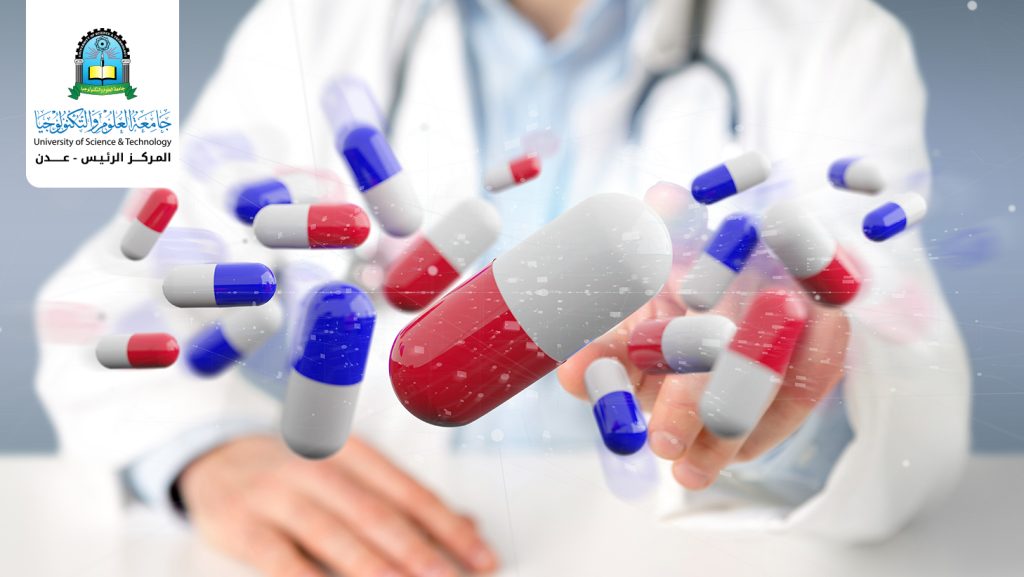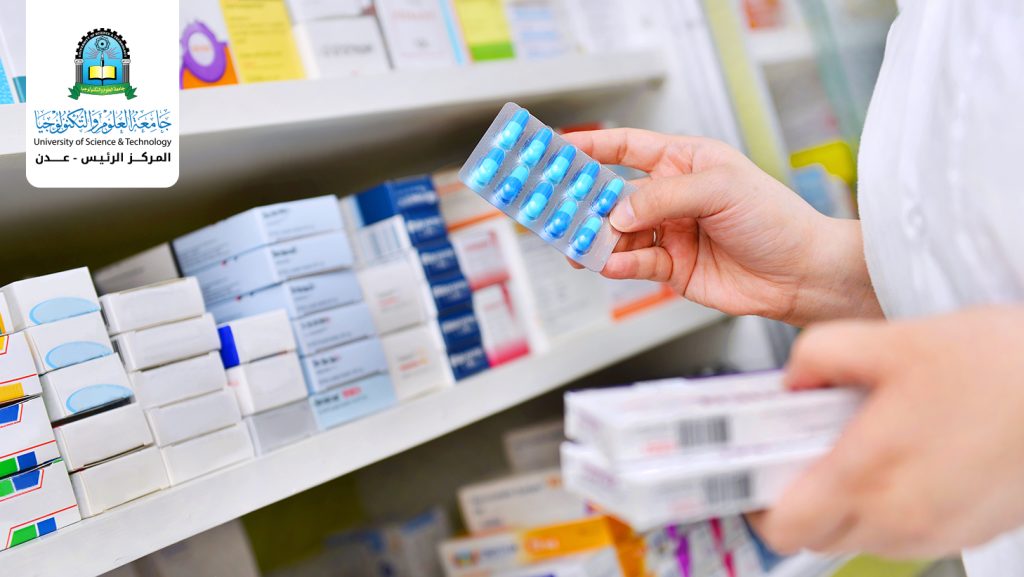Program Goals
The program aims to graduate a cadre of pharmacists capable of:
- Preparing specialized competencies in the fields of clinical pharmacy who demonstrate competence in drug management to improve the health of the individual and society.
- Enhancing the capabilities of the program’s students in the fields of scientific research and studies concerned with the development and discovery of pharmaceutical preparations and compounds, with a focus on investing in local natural resources.
- Enabling the student to use the skills of “analytical-critical thinking”, “problem solving”, “continuing education”, etc., to enhance the status of the profession of pharmacist by contributing to finding practical solutions to the challenges facing the manufacture and use of medicine within the health system.
- Strengthening “professional ethics” and the concepts of “self-control” and “professional responsibility” to form the most important components of the personality of the pharmacist who graduated from the “Doctor of Pharmacy” program at the University of Science and Technology.
- Training students on the principles of management and leadership to enhance their academic and ethical qualifications in order to achieve professional excellence in the local, regional and international labor market.
Undergraduate Programmes
- Arabic for requirements
- English for specialized subjects
six years

Program Features
- The increasing demand for it in recent years is due to the pivotal role played by the “Pharmacist Doctor” in terms of his contributions to the “pharmaceutical industry” and improving the “uses of medicine” in society.
- As a result of the first advantage, the second advantage of this program arose, which is the increasing demand for employing “doctor pharmacists” within health facilities and pharmaceutical factories.
- Our university’s Doctor of Pharmacy program adopts a modern curriculum (in English) that has been specially prepared to keep pace with the latest requirements of the profession of “Doctor of Pharmacy” to qualify the graduate with an accredited certificate that facilitates his opportunity to work locally, regionally and internationally.
- The program features a large training component, providing students with practical training opportunities in the college’s laboratories and pharmaceutical factories, in addition to clinical training at the University of Science and Technology’s teaching hospital and in health facilities affiliated with the Ministry of Health and private sector partners.
- The program’s academic team is distinguished by its diverse academic and professional-practical experiences, as this experience is distributed among local, regional and international higher education institutions.
- The program has an integrated educational environment that includes well-equipped lecture halls and laboratories, and provides various types of student services, including: a paper and electronic library, primary health care service, a gym and various student activities, student guidance, etc.
- To enhance the skills and personality of the “Pharmacist Doctor”, the program offers its students qualification opportunities in various programs, such as: studying “English Language”, obtaining an international computer driving certificate. ICDLMastering the most important personal skills required to study the program and compete in the labor market (activities, practical training).
Career Opportunities
- Graduates of the program will have multiple job opportunities after graduation in different countries around the world, as the profession of “Doctor of Pharmacy” is considered one of the modern and globally demanded specializations.
- Graduates have many opportunities for higher qualification in postgraduate programs, both regionally and internationally. Among the postgraduate specializations that “Doctor of Pharmacy Pharmacist” is unique in are: Therapeutic Nutrition Pharmacy, Surgical Pharmacy, Oncology Pharmacy, Emergency/Intensive Care Pharmacy, Pediatric/Geriatric/Kidney/Organ Transplant/Outpatient Pharmacy, Pharmaceutical Manufacturing, Pharmaceutical Design, Quality Control, Toxicology Analysis, Forensic Toxicology, Drug Information, and many other specializations.
The job fields available to graduates of the Bachelor’s degree in “Doctor of Pharmacy” include work in:
- Cancer and intensive care centers, kidney, internal medicine and infectious diseases centers, as well as orthopedic and psychiatric centers.
- Hospital Quality Management, Community Pharmacies and Hospital Pharmacies
- Pharmaceutical industry, Supreme Authority for Medicines.
- Academic work, such as colleges of pharmacy at universities and community colleges.
- Pharmaceutical research and scientific research centers.
- Pharmaceutical media (scientific promotion), medical websites and medical translation.
Admission requirements
- General Conditions:
- As in the admission and registration guide.
- special conditions:
- A high school score of at least 75%.
- No more than 5 years have passed since the high school diploma.
- The student submits an original and a certified copy of the high school diploma.
- The student submits a copy of the ID card if he is Yemeni and a copy of the passport if he is a foreigner.
A detailed explanation of the PharmD program:
To prepare a clinical pharmacist capable of serving the community, providing patient-centered care and actively participating in other areas of pharmacy through advanced education, clinical training, and joint research.
- Enhance students' knowledge and skills in various academic disciplines.
- Supporting practical and scientific research efforts in various fields.
- Linking learning outcomes to labor market requirements
- Expanding partnerships and developing relations with universities and other scientific research institutions locally, regionally and internationally.
- Prepare graduates to provide high-quality patient care and the ability to work with other healthcare professionals to meet patients' needs.
A six-year undergraduate program with a total of 205 credit hours, primarily aimed at providing academically competitive education and professional training in pharmacy, both theoretical and practical, so that students acquire up-to-date knowledge and understanding as well as develop minds to appreciate and apply primarily acquired knowledge, skills and technology For the benefit of their community and profession by providing evidence-based advice to patients and the public on public health issues. Graduates will have a strong academic foundation and will be competitive pharmacists prepared for their roles in improving healthcare. This program started in 2017, and was approved based on the following regional and global references:
- King Saud University
- University of Jordan
- Qatar University
- Jordan University of Science and Technology
- Boston University
- The program consists of two parts:
- Clinical pharmacology department:
It includes all materials related to hospitals, treatments and administration in the pharmacy profession.
- Department of Pharmaceutical Sciences:
It includes all the basic subjects of pharmacy education such as analytical chemistry - organic chemistry - pharmaceutical chemistry - drugs and medicinal plants - pharmacology and toxicology.
As well as some subjects related to the pharmacy profession in fields other than hospitals, such as pharmacies and alternative medicine.
Program Structure
It is the “preparatory year” stage, during which students learn basic sciences that qualify to study medical professions.
This stage contains: Biology - Chemistry - Mathematics - Arabic language - Holy Quran and Islamic culture - English language - medical terminology - computer - education skills - and ethics of medical professions.
Pre-clinical application stage. This stage consists of two academic years, during which students are rehabilitated through medical subjects and the foundations of pharmaceutical sciences related to the pharmacy profession. This stage is divided into:
The first year: during which it is taught:
Medical stuff: Anatomy and histology - physiology - biochemistry - immunology.
Pharmaceutical science subjects: Pharmaceutical Organic Chemistry - Analytical Chemistry Pharmaceuticals - Pharmacies - Professional Communication Skills
Second Year: It teaches:
Pathology, physiology, microbiology, pharmacology, toxicology, pharmacology, pharmacology, drug discovery, design and development, integrated care laboratory, pharmaceutical chemistry, drug information services and analysis of drug information sources.
It is the “clinical application phase” as it is divided into two academic years, during which clinical pharmacy courses are studied, and it contains eight courses for therapies - pharmacy information systems - guides to the foundations of pharmacy - pharmacoeconomics - marketing and pharmaceutical management - drug interactions and pharmaceutical genetics - drug kinetics - epidemiology Principles of scientific research for pharmacy. In addition to - pharmacy practice - pharmacology - alternative medicine - pharmacy ethics and law - pharmaceutical chemistry - biostatistics - as well as training in community pharmacies at this stage.
It is represented in the “Training and Excellence” stage, which is the sixth academic year, where students are trained clinically through (Rotations) courses in various therapeutic departments in hospitals (University Hospital and Oncology Center), and they include departments: Cardiology and Thoracic - Internal Medicine - Intensive Care Unit - Integrated pharmacy care - reception and critical cases unit - children - hematology and oncology - hospital pharmacy, where the training lasts for ten consecutive months.
Through this final stage, students must prepare a graduation project under the supervision of a faculty member from the college in one of the fields of pharmaceutical sciences.

Documents specification of the program and courses of the Bachelor of Pharmacy

